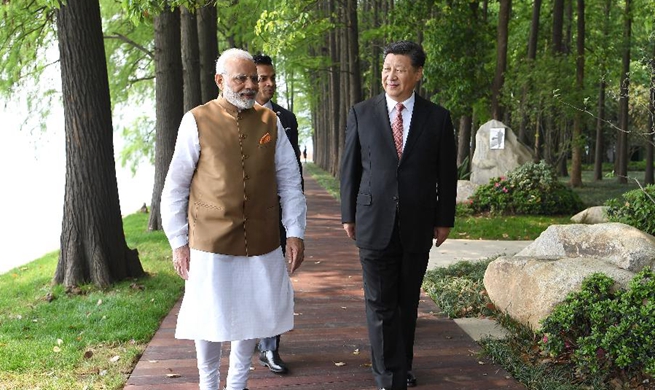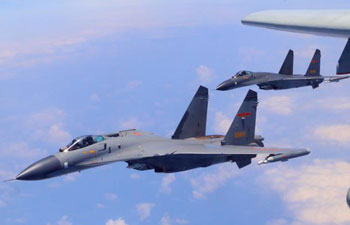JERUSALEM, April 28 (Xinhua) -- On a sunny morning in the Israeli coastal city of Tel Aviv, hundreds of venture capitalists and hi-tech businessmen gathered to learn about the bustling hi-tech scenes in the country.
The delegation, composed of more than 500 people worldwide who participate in a two-year program, was hosted by the non-profit organization Start-Up Nation Central (SNC) and the Jerusalem Development Authority.
The group arrived at the beginning of the week as part of the Kauffman Fellows Annual Summit, a conference held annually for the past decade. It's the first time to be held in Israel.
Israel is considered one of the leading global hubs for hi-tech and innovation. In the past two decades, over 10,000 start-up companies have been founded by Israelis, several of whom sold to global giants, such as Google, Intel, and Facebook.
"Everyone is looking at Israel," said Karin Gattengo, vice president of Strategic Partnerships at SNC. "We are leading in technologies and in new innovations, not only in technology, but also in business models."
According to the SNC, there are over 5,800 active start-up companies in the country currently with approximately 1,000 new ones being founded each year.
"There are other hubs," Gattengo told Xinhua, "but there's a very vivid early stage community over here which does not exist in any other place except for Silicon Valley."
Considered to be only second to the American region also known for its nurturing hi-tech eco-system, Israel has maintained this status for the past decades with major multi-national companies setting up shops in the country.
John McIntyre, a vice president at Kauffman Fellows and one of the organizers of the summit, said that "risk tolerance is a problem for many eco-systems."
"In many cultures business failure is a negative thing and there are few places in the world where it is kind of celebrated and OK culturally to try and fail, try and fail -- here, it's a very accepted thing," he told Xinhua.
While in some cultures failure is not an option, in Israel it is almost a pre-condition for success. Many of the country's leading entrepreneurs have resounding and epic failures on their resume.
For Nihar Neelakanti, an American venture capitalist and a member of the delegation, this is the main lesson he has learned from his Israeli counterparts.
"To take more risks, maybe to try and even if you fail, try again," Neelakanti told Xinhua. "Clearly something is going right here."
As he walked around a hip Tel Aviv restaurant, Neelakanti was very enthusiastic seeing food technology booths on display for the summit.
"For such a small place to have so much venture capital and start-ups per capita -- its outstanding and if this is just the beginning, then I can't wait to see what happens in the next five to ten years," he said.
The relationship between the private sector, the government and Israel's military has been a source of curiosity for many onlookers. This triangle has resulted in a multitude of successful technological developments in many fields.
Military service in the country is mandatory. Many young Israelis who do their military service in technological units leave the army and move on to create civilian start-ups inspired by their valuable combat experience.
"We've learned a lot," said Victoria Fram, an American venture capitalist. "Rather than looked at some of the constraints, they have seen them as opportunities and that's a tremendous entrepreneurial skill."
As the delegation toured Tel Aviv, they saw demonstrations from start-up companies in fields including sports and agriculture and participated in discussion panels with Israelis.
Sitting in a patio of an exclusive boutique hotel discussing the future of hi-tech, the complex politics of Israel were absent.
Situated in a hostile region and in a constant controversial position internationally, Israel's hi-tech industry serves as the country's best diplomat. It is the industry that might be the key to peace in the future.
"In the long run, we believe it will be economic development that spreads from Israel to hopefully the rest of the Middle East that really draws politicians to come up with solutions," McIntyre told Xinhua.
"Innovation and technologies - this is the only way to build bridges between countries," Gattengo said.
With Israeli hi-tech attracting billions of dollars in foreign investment every year, the optimism of all those participating in the summit was difficult to escape.

















